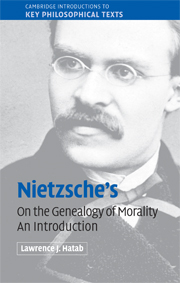Book contents
8 - The Genealogy and political philosophy
Published online by Cambridge University Press: 05 June 2012
Summary
At the close of the Nicomachean Ethics (1179a34ff.), Aristotle deals with a question that is often posed against virtue ethics: If goodness is a matter of self-manifesting virtue, what if people are not developed in virtue and prone to vice? Aristotle's answer is not that they need adherence to some moral principle (why would a vicious person commit to any rational principle?), but that this is where the sphere of ethics requires the sphere of politics and law. Politics differs from ethics in providing external forms of coercion that punish bad behavior or help motivate people with under-developed virtue. Aristotle says that the immediate effect of law is to motivate people by fear rather than reason or ethical education. Political and legal institutions reflect in one way or another the norms and values of a society, but with the addition of tangible and coercive penalties in response to transgressions. Such institutions could be said to embody the limits of virtue, of a self-motivated ethical life. Public regulations represent an external force governing the self, but the issue of virtue could still be a central concern in addressing how human beings exist ethically in a lived sense. Aristotle actually saw the ethical and political spheres to be a unified social domain; he even describes his ethics as a part of political philosophy (1094a27ff.). In any case, the question of politics will always involve matters of coercive force in social life.
- Type
- Chapter
- Information
- Nietzsche's 'On the Genealogy of Morality'An Introduction, pp. 243 - 273Publisher: Cambridge University PressPrint publication year: 2008

